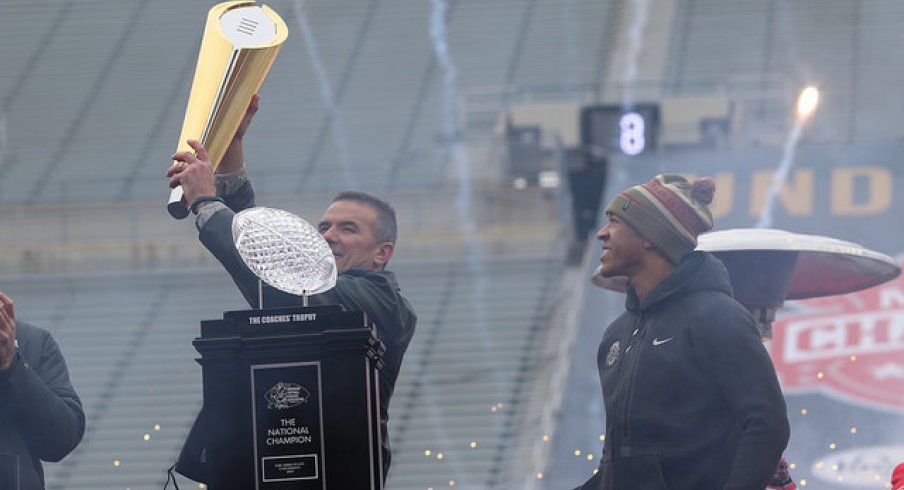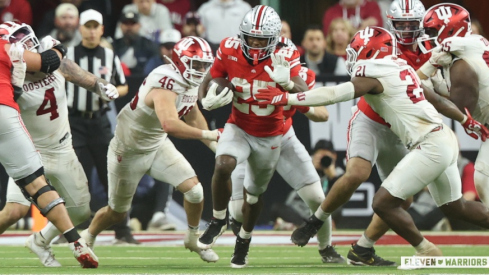Woody Hayes is an integral piece of Ohio State history and a legend to any football fan. But are Urban's first five years in Columbus better than Woody's best five?
First things first, we'll have to find out which five-year period was the best of Woody Hayes' tenure with the Buckeyes, otherwise his five best years would just be the five times his team won a national championship and it's hard to argue with that.
The first period that jumps off the page as Woody's best is 1968-1972, a span of years that saw two national titles in '68 and '70 and conference titles in '69 and '72. 1971 might take down the overall prestige of this period as the team went 6-4 and finished tied for third in the Big Ten that season, but two national titles and two conference titles in five years is nothing to scoff at.
Other candidates include 1954-1954 — five seasons that also saw Hayes guide the Buckeyes to two titles, but only one conference title otherwise and two seasons with only six wins — 1957-1961 — roughly the same story, but losing seasons in between two championships — and 1973-1977 — a period that included no national championships but five conference titles and three consecutive 10-win seasons.
Maybe you're of the belief that the 1969 team has to be included as it was one of Woody's best, or maybe you think the 1973 team was a bit better, but for the purposes of this piece, we'll take a look at Ohio State football from 1968-1972 and from 2011-2016.
Perhaps the most obvious indicator of a successful season is a national championship. In comparing these two five-year periods of Ohio State football, Woody Hayes is the leader as Meyer has only one compared to Hayes' two (which happened in the span of just three seasons).
However, it is worth noting that the Bucks' 1970 title was awarded by the National Football Foundation rather than the AP (jeez, I bet all you readers are thankful there's a playoff system in place now) and the team actually lost the Rose Bowl to end the season, 27-17 to Stanford.
This is hair splitting of course, because the history books say that Ohio State was the (one of) the champion(s) that season, and this isn't the place to dispute that. Advantage Woody.
Another metric you could use to gauge success for a team is bowl game performance. Ohio State currently holds a 22-25 record in bowl games, and plenty of those wins came from under Wayne Woodrow Hayes' tenure, but we're only looking at 1968-1972 for this piece.
Sadly, the bowl system wasn't quite as expansive back in Woody's hayday, and he's hurt a bit by that (i.e. there was no Taxslayer Bowl for Hayes' teams to participate in during a down year) here. The only bowl game victory for Hayes in that span was in 1968. The team lost two Rose Bowls: the aforementioned 1970 Rose Bowl, and a 42-17 thwomping at the hands of USC in 1972.
Meyer's Ohio State teams certainly haven't needed the expanded bowl system to flourish, as by my record, the least prestigious bowl game one of his team's have played in is either the Orange Bowl (2013) or the Fiesta Bowl (2016), and those also were his only losses.
Again, the bowl system has changed greatly, so in 2014, Meyer was able to get two bowl victories as the team captured the first ever CFP national championship, and when you add the 2015 Fiesta Bowl, Meyer boasts three wins and a winning bowl record at Ohio State. This metric goes to Meyer.
Another way to measure coaching success is through conference titles. This is a language we can all speak and understand, one of our most valuable tools in arguing with fans of rival Big Ten teams, and... another place where Woody takes the cake.
Woody led his team to two outright titles (1968, 1970) and two shared titles (1969, 1972) in his best five-year span, while Urban Meyer has only one so far (2014). Sure, the Big Ten landscape may be different now (See: four Big Ten teams in the Coaches Poll top 10), but the argument is once again in Woody's favor.
Winning percentage is perhaps one of the best stats to look at over a large sample to get a good idea of how good/great/awful a team is over a period of time. While five years isn't necessarily a large sample, it is a big enough one to work with a look at as a measuring stick for two of Ohio State's best coaches.
From 1968-1972, Ohio State accumulated a 42-8 record, and half of those losses came in the 1971 season, which was a down year by any measure for the program. Those wins give Woody a .84 winning percentage. Not too shabby. (P.S.If you throw out the 1971 season, Woody's winning percentage moves up to .905. What a difference a down year can make.)
However, Woody can't quite hold a candle to Meyer in this category, as the team's record since 2011 is 61-6, which gives Meyer a .91 winning percentage as the Buckeyes head coach. Meyer may be helped by playing more games, but to amass more wins with fewer losses in the same amount of time is still pretty impressive.
All of these metrics have been great and all, but it's time for the big finale, the one and only, the decider: wins against Michigan.
Every Ohio State fan knows that a team can be good all season long, but the thing that will win over the hearts of real fans is a win over That School Up North. An otherwise amazing season can be tarnished in the hearts of fans forever if the team doesn't secure a win in The Game.
I'm sure no Buckeye fan needs to be reminded that Urban Meyer has yet to lose The Game, but I'll mention it just for fun: Urban Meyer is 5-0 against Michigan in his five seasons as the Buckeyes' coach. I'm sure that brightened someone's day.
Woody Hayes, from 1968-1972, though, had a rougher go of things. After an iconic 50-14 win over Michigan in 1968, the Bo Schembechler-led Wolverines beat Ohio State in 1969 and kicked off what has come to be known as the Ten-Year War. What that means, for the purpose of this article, is that the teams alternated blows from year to year, and Woody led the squad to a 3-2 record against That School Up North.
As you can tell, these two periods of Buckeye football stack up pretty evenly. It's difficult to tell which coach was more successful during these periods or if they were both roughly the same, and that all depends on what matters the most to you. If it's national championships you like, Woody is your guy. If it's wins over Michigan and bowl wins, Meyer takes the cake. Either way, the greatness of these two coaches is immense, and if Meyer continues down this path, he might one day be able to challenge Woody as the greatest coach in program history.


